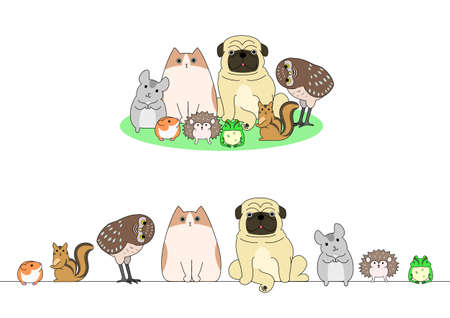Introduction to Nutrition for Adopted Indian Pets
Welcoming an adopted pet into your home in India is a heartwarming journey filled with love and new beginnings. Whether you have chosen to adopt a street-savvy Indian cat or a loyal Indie dog, understanding their unique nutritional needs is essential for their happiness and health. Many adopted pets in India come from diverse backgrounds—some may have survived on the streets, while others might have been rescued from challenging situations. These experiences shape their dietary habits and requirements, making it crucial for pet parents to provide balanced nutrition tailored to each fur baby’s history.
Balanced nutrition is the foundation of your adopted pet’s wellbeing. It supports everything from shiny coats and healthy skin to strong immunity and boundless energy for those playful zoomies. In India, local diets, cultural preferences, and regional ingredients play a significant role in shaping what we feed our pets. Unlike pedigree breeds that may be accustomed to commercial kibble, Indian cats and dogs often thrive on fresh, homemade meals featuring rice, curd, chicken, or lentils—foods that are gentle on sensitive tummies and familiar from their early days.
As loving pet parents (and proud cat servants!), it is our responsibility to respect these unique backgrounds while transitioning our adopted companions to healthier routines. By being mindful of their past experiences with food scarcity or irregular meals, we can gradually introduce nutritious diet plans that suit their individual needs. In the following sections, we’ll explore how to create wholesome meal plans using locally available ingredients and ensure your adopted pet receives all the essential nutrients for a purr-fectly happy life.
Understanding Common Dietary Needs in Indian Context
When it comes to the nutrition and diet plans for adopted pets in India, understanding their basic dietary needs within the Indian context is essential. Our furry companions, whether they are adorable desi cats or loyal indie dogs, thrive best when their meals include key nutrients balanced with love and care. Let’s take a gentle look at what our pets truly need, and how traditional Indian foods can be both nourishing and safe for them.
Key Nutrients for Pets
Just like us, pets require a blend of macronutrients and micronutrients to stay healthy. Here’s a quick overview:
| Nutrient | Role in Pet Health | Indian Food Sources (Safe for Pets) |
|---|---|---|
| Protein | Builds muscles, supports growth & repair | Boiled chicken, eggs (well-cooked), paneer (in moderation) |
| Carbohydrates | Energy source, aids digestion | Cooked rice, sweet potatoes, pumpkin |
| Fats | Energy, healthy skin & coat | Coconut oil (small amounts), ghee (very little), fish oil |
| Vitamins & Minerals | Immunity, bone health, metabolism | Carrots, spinach (cooked), apples (no seeds), curd/yogurt (plain) |
| Water | Hydration, organ function | Clean drinking water always available |
Considering Indian Climates & Lifestyles
The Indian climate varies from hot summers to monsoons and chilly winters in some regions. Pets need extra hydration during warm months—think cool fresh water bowls refilled throughout the day. In humid areas, light meals with easy-to-digest carbs like cooked rice or pumpkin can help prevent tummy upsets. During winters, slightly warming foods such as boiled chicken broth or a dash of coconut oil can offer comfort.
Traditional Feeding Practices & Local Foods
Many Indian homes love sharing roti or dal with their pets. While this is heartwarming, it’s important to know that wheat-based rotis should be given sparingly due to gluten content, and dals should be plain—without spices or salt. Always avoid onions, garlic, chocolate, grapes, and anything spicy or heavily salted as these are harmful for both cats and dogs.
A Gentle Reminder from Your Resident Cat:
Purrlease remember—each pet is unique! Observe your companion’s reactions to new foods introduced slowly and consult a vet if you’re unsure. With mindful choices inspired by our rich Indian kitchen, we can keep our beloved pets healthy and happy at every mealtime.

3. Creating Personalised Diet Plans for Your New Family Member
Welcoming a rescued pet into your Indian home is truly a heartwarming experience, and as a loving cat parent, you naturally want to give your new furball the best start in their fresh chapter of life. Every adopted pet arrives with a unique history and set of needs, so their nutrition plan must be tailored to suit their age, breed, health condition, and the food they were accustomed to at the shelter.
Understanding Their Age and Stage
Kittens and puppies require more protein, calcium, and energy compared to adult or senior pets. If your new friend is still a baby, go for specially formulated puppy or kitten food—many Indian brands like Drools and Heads Up For Tails offer options packed with essential nutrients. For adults, balanced meals with controlled calories are key, while seniors may need easily digestible diets that support joint health and immunity. Always consult your vet before making any big changes.
Considering Breed & Size
India’s beloved Indie breeds often have different dietary requirements compared to pedigreed pets. Larger breeds might benefit from diets rich in glucosamine for joint care, while smaller ones may prefer kibble that suits their tiny mouths. Ask your shelter about the pet’s background or observe their preferences as you gradually introduce new foods.
Transitioning from Shelter Meals
Most animal shelters in India serve basic meals—often rice with chicken or veggies—to meet general needs. When bringing your pet home, it’s important to transition slowly over 7-10 days: mix increasing amounts of your chosen diet (home-cooked or commercial) with their old food each day. This gentle shift prevents tummy upsets and helps your buddy adjust without stress.
Home-Cooked vs. Commercial Diets
Indian kitchens are full of wholesome ingredients like rice, dahi (curd), paneer, chicken, fish, pumpkin, and carrots. You can prepare balanced meals at home but always avoid onions, garlic, chocolate, and bones. If you prefer commercial food, choose reputable Indian brands that follow AAFCO guidelines. Look for those enriched with taurine for cats or omega fatty acids for shiny coats.
Special Health Needs
If your adopted pet has allergies or chronic health issues (quite common among rescues), work closely with your veterinarian to create an appropriate meal plan. There are prescription diets available in India for kidney issues, sensitive stomachs, or skin conditions—and sometimes a simple homemade khichdi is just what the doctor ordered!
The journey from shelter fare to personalised dining is all about patience and love. Take time to learn what makes your precious companion purr (or wag!), and you’ll soon see them thrive in their forever home under your gentle care.
4. Indian Ingredients & Home-cooked Food for Pets
As loving pet parents in India, we often wish to pamper our adopted fur babies with nourishing home-cooked meals made from fresh, local ingredients. Not only does this allow us to control the nutrition and quality of what goes into their bowls, but it also helps in bonding with our pets through thoughtful care. Here’s a guide to some commonly available Indian ingredients that are both safe and beneficial for dogs and cats, along with simple recipe ideas and tips for preparing wholesome meals at home.
Commonly Available Indian Ingredients That Are Pet-Friendly
| Ingredient | Benefits | Notes |
|---|---|---|
| Rice (White/Brown) | Easily digestible source of carbohydrates, gentle on sensitive tummies | Always cook thoroughly; avoid adding salt or ghee |
| Chicken (Boneless, Boiled) | Lean protein that supports muscle health and energy | No spices, onion, or garlic; remove all bones |
| Pumpkin | Rich in fiber and vitamins, helps digestion | Boil and mash before serving |
| Carrot | High in beta-carotene and antioxidants | Chop finely or grate for easy chewing |
| Cottage Cheese (Paneer) | Good source of protein and calcium for strong bones | Serve plain, in moderation for lactose-sensitive pets |
| Dhal (Moong/Toor) | Plant-based protein, easy to digest when cooked well | Avoid tempering with spices; serve plain and mushy |
| Egg (Boiled/Scrambled without oil) | Excellent source of protein and healthy fats | Avoid raw eggs due to salmonella risk |
| Soybean/Tofu (for Dogs) | Protein-rich vegetarian option; good for variety | Introduce slowly; check for allergies first |
| Coconut Oil (Small Amounts) | Supports skin and coat health, aids digestion | Add a teaspoon to food occasionally for shine! |
| Sweet Potato (Boiled/Mashed) | Packed with fiber, vitamins, and minerals | Peeled and boiled; do not feed raw or fried versions |
Simple Home-cooked Meal Ideas for Pets in India
- Chicken & Rice Bowl: Boil boneless chicken pieces with rice and carrot. Shred the chicken and mix everything together. Cool before serving.
- Dhal & Vegetable Mix: Cook moong dhal until soft. Add pumpkin and carrot. Mash together for a protein-packed meal—especially suitable for dogs with sensitive stomachs.
- Pumpkin Paneer Mash: For cats or small dogs, boil pumpkin until tender, crumble some paneer on top, mash together lightly, and serve.
Tips for Preparing Nutritious Home Meals for Your Adopted Pet:
- No Spices or Salt: Avoid using masalas, chili powder, salt, or any spicy tadka while cooking for pets.
- No Onions or Garlic: These are toxic to both dogs and cats—even in small amounts.
- Avoid Fried Foods: Stick to boiling, steaming, or baking ingredients instead of frying.
- Mash or Chop Well: Ensure food is soft and cut into small pieces to prevent choking hazards.
- Transition Slowly: If introducing home-cooked food to your adopted pet’s diet, do so gradually over several days to avoid tummy upsets.
Nurturing With Love—The Indian Way!
Caring for your adopted pet in India means embracing our rich culinary heritage while prioritizing their health. With mindful choices and a little creativity in the kitchen, you can offer nutritious home-cooked meals made from everyday Indian ingredients—ensuring your furry friend feels cherished every single day.
5. Dealing with Special Cases: Streetie Adaptation, Allergies, and Recovery Nutrition
Adapting Streeties to Home Life and Food
Bringing a desi streetie or rescued indie home is a journey of patience and love. These precious souls are used to scavenging and may be hesitant to try new foods. Begin by mixing small portions of home-cooked rice, curd, or dal with their familiar smells—think leftover chapati bits or boiled egg. Gradually introduce proteins like boiled chicken or fish (boneless) along with veggies such as carrots and pumpkin. Always ensure the food is bland, avoiding masala, onion, garlic, and chillies which can upset their sensitive tummies.
Managing Pet Allergies the Indian Way
Some pets, just like us humans, can show allergic reactions—itchy skin, red eyes, or runny noses. Common allergens in India include dairy (paneer, milk), wheat (atta), and sometimes even chicken. If you notice these signs, try an elimination diet: for 1-2 weeks feed plain rice and boiled veggies while removing suspected triggers. Slowly reintroduce single protein sources like mutton or fish, watching for any return of symptoms. For treats, stick to simple roasted peanuts (if not allergic) or homemade sweet potato chews. Don’t forget—always consult your local vet if symptoms persist.
Nutrition for Recovering Malnourished Pets
If your adopted furball has come from a tough background—thin frame, dull coat, low energy—they need gentle nourishment to recover. Begin with easily digestible foods: moong dal khichdi with ghee, curd rice for probiotics, and soft-boiled eggs for protein. Small but frequent meals are best; gradually add cooked chicken liver for iron and calcium-rich paneer cubes if tolerated. Coconut water is a wonderful hydrating treat in our Indian summers! Avoid sudden diet changes; instead, build up variety slowly so their tummy adjusts comfortably.
Locally Accessible Resources & Tips
India’s local markets are treasure troves: ask for fresh veggies from the sabziwala, source fish scraps from your neighbourhood machiwala, and buy unseasoned bones from the butcher for soup stocks (never give cooked bones!). Many communities also share leftover rotis or rice—just ensure these are free from oil and spice before sharing with your pet. Remember: each adopted pet’s journey is unique; listen to their needs with kindness and patience—a happy belly means a happy heart!
6. Tips for Smooth Transition: From Street or Shelter to Forever Home
Welcoming an adopted pet into your Indian home is a journey filled with love, patience, and learning. Whether your furry friend was once roaming the bustling lanes of Mumbai or waiting in a shelter in Chennai, their tummy and heart need gentle care as they settle in. Here are some cat-approved tips for making nutrition transitions smooth and nurturing, so your new companion feels safe and cherished from day one.
Start Slow & Gentle
The first few days in a forever home can be overwhelming for pets used to street food scraps or basic shelter fare. Begin by offering small portions of easily digestible foods—think boiled rice, chicken (boneless and unspiced), or vet-recommended starter kibbles. Gradually mix in their new diet over 7-10 days to avoid tummy upsets common among Indian indie breeds and rescue cats.
Stick to a Routine
Cats especially thrive on predictability! Serve meals at regular times and in the same quiet spot. This routine creates security and helps sensitive stomachs adjust gently to changes in nutrition. If you’re introducing high-quality Indian brands like Drools or Farmina, blend them slowly with familiar tastes.
Observe & Adjust
Every whisker-twitch and tail flick is a clue—watch closely for signs like loose stools, vomiting, or refusal to eat. These may signal stress or dietary intolerance. Don’t hesitate to consult your local vet in Delhi or Bangalore for advice tailored to your pet’s unique background.
Create Feeding Rituals
Turn mealtimes into bonding moments! Softly call your pet, use a gentle voice, and perhaps add a loving head-scratch before the bowl goes down. In Indian homes where families gather for meals, include your pet’s feeding ritual as part of daily togetherness—it builds trust and reassures them they belong.
Don’t Rush Special Treats
Resist the urge to offer too many treats like paneer bits or fish fry right away. Stick with vet-approved snacks until your pet’s digestion settles. With time, you can introduce safe Indian treats that suit their palate and nutritional needs.
Patience is Purr-fect
Remember: every adopted cat or dog carries stories in their eyes. Some may take weeks before they finish a meal without glancing over their shoulder; others will curl up content after one bite. Be gentle, be patient—and celebrate every small step towards health and happiness in their new Indian home.


